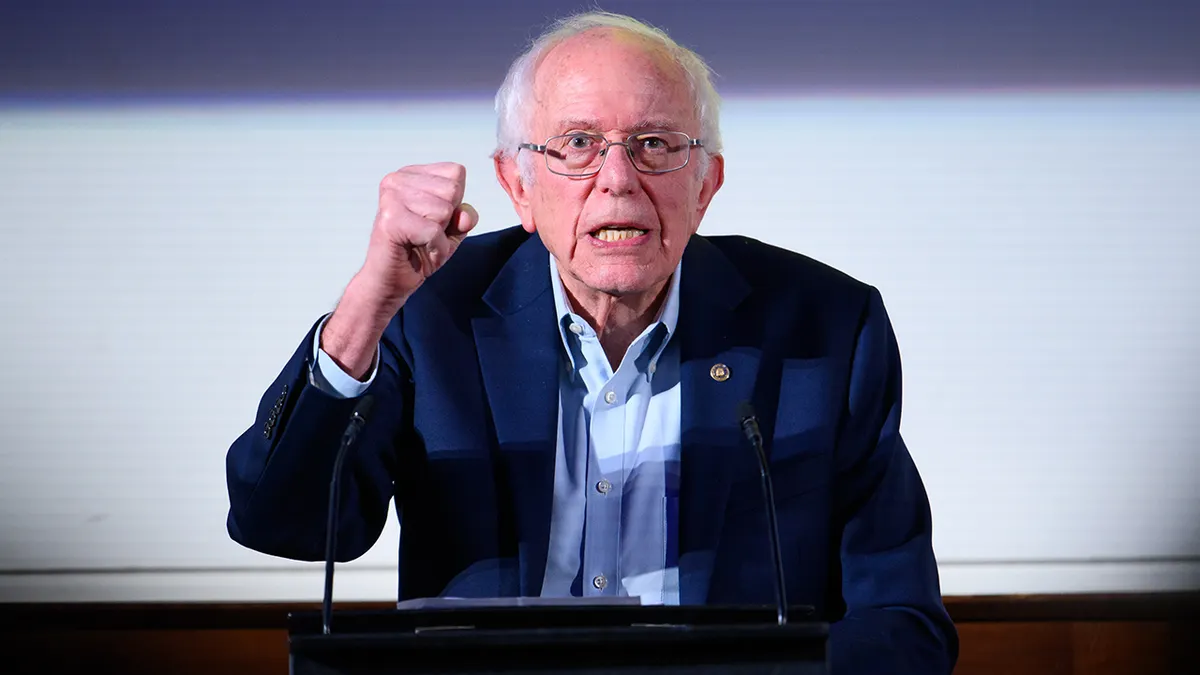Billionaires vs. the Ballot: Bernie Sanders’ Urgent Plea to Elect Zohran Mamdani
A City Drenched in Ads and Money
The posters are everywhere. From the subways of Queens to the taxis on Fifth Avenue, New Yorkers can’t escape the surge of glossy campaign ads trying to shape their vote.
Behind the slogans and smiling faces lies a staggering figure: $19 million—the amount Senator Bernie Sanders says billionaire donors have already spent to defeat Zohran Mamdani in the city’s mayoral race.
“Over the next week, they’re going to spend a hell of a lot more,” Sanders warned in a post that went viral overnight. “If New York is going to stand up to the oligarchy, we need everyone to get out the vote and elect Zohran Mamdani.”
For Sanders, this isn’t just another election—it’s a moral crossroads. Bernie Sanders wrote in a post on X that “billionaires have spent $19 million to try and defeat Zohran Mamdani.”

Have New Yorkers have been betrayed’: can Zohran Mamdani become the most progressive mayor in the city’s history?
The Heart of the Message
In a short but fiery video, Sanders cut straight to the point:
“Let me cut to the chase. The billionaires have already spent $19 million to try to defeat Zohran Mamdani for mayor of New York. In this last week, they're going to spend a hell of a lot more. Our job is to do everything that we can to bring out the vote.”
It’s classic Bernie—urgent, plainspoken, and aimed squarely at working-class voters who feel locked out of a system tilted toward the rich. He doesn’t just ask people to vote; he pleads for them to bring “our moms and dads and coworkers, our uncles, our aunts, everybody else to the polls.”
The senator’s emotional cadence recalls his 2016 and 2020 rallies—a populist rhythm that pits ordinary people against extraordinary wealth.
Who Is Zohran Mamdani—and Why Is He Being Targeted?
Mamdani, the Queens-born son of Ugandan-Indian immigrants, made his name in the State Assembly as a progressive voice for rent control, public housing expansion, and stronger tenant protections.
His campaign for mayor has ignited enthusiasm among young voters, labor organizers, and tenants who see him as a rare candidate willing to confront corporate power head-on.
That’s also why he’s become a magnet for opposition. Real-estate groups, finance executives, and political action committees have poured money into attack ads painting him as “too radical” for New York.
To Sanders and his supporters, that backlash only proves one thing: Mamdani’s policies threaten entrenched financial interests.
The $19 Million Power Play: How Billionaire Spending Warps New York’s Economy
Behind every campaign ad lies a calculation. The $19 million that billionaires have poured into this race isn’t charity—it’s investment. In New York, political influence often pays higher returns than Wall Street portfolios. A single zoning change or tax-break extension can turn a few hundred thousand dollars in donations into a multimillion-dollar windfall.
According to a 2024 Brennan Center report, real-estate and finance donors contributed over 60% of total campaign funding in recent city elections. That influence seeps into housing, wage policy, and even consumer prices. When billionaires dominate campaign spending, policy tends to protect assets, not affordability.
It’s why New York’s median rent now hovers above $4,500 a month—a record high that squeezes both renters and small businesses.
Political money, in effect, rewrites the cost of living.
The flood of billionaire-funded ads also drives up media prices, pushing local candidates and community causes off the airwaves. Small businesses face inflated advertising rates, which ripple outward as higher prices for customers. Every voter may not see the campaign receipts, but they feel the economic aftershocks in their rent, coffee, and grocery bills.
When Sanders calls this election a fight against “the oligarchy,” he’s naming a system where politics has become an extension of the market—and where the market increasingly dictates who governs.
Why This Race Matters Far Beyond City Hall
To Sanders, Mamdani’s campaign is a stress test for democracy itself. Can grassroots organizing still overcome unlimited wealth? Can human voices still out-shout super PAC megaphones?
If Mamdani wins, it would signal that small-donor, people-powered politics can survive in the nation’s most expensive media market. It would echo Sanders’ own vision: that ordinary people, when organized, can outperform billionaires armed with money and consultants.
But if the billionaire-backed candidate prevails, it reinforces the grim arithmetic that cash—not conviction—still decides elections.
What Voters Are Feeling
Talk to residents in Jackson Heights or Harlem, and you’ll hear exhaustion mixed with quiet determination. Some are angry at the constant negative ads. Others say the billionaire involvement makes them more likely to vote.
“I’ve never seen this much money thrown around,” said one Bronx bus driver. “If they’re spending that much to stop him, he must be doing something right.”
The sense of struggle—of ordinary families versus the financial elite—has turned this local race into a national conversation about who owns the future of American cities.
The Emotional Undercurrent
Sanders’ message resonates because it’s personal. It taps into something New Yorkers feel daily—the weight of inequality.
When he says, “Let’s get our moms and dads and coworkers to the polls,” he’s reminding people that democracy isn’t abstract. It’s built around kitchen tables, union halls, and late-night conversations between neighbors who still believe change is possible.
Behind the statistics and spending totals, this is a story about belonging: whether the city will be shaped by the people who live and work there, or by those who treat it as another investment property.
The Bigger Picture: Money, Power, and the Price of a Vote
The billionaire spending surge isn’t unique to New York—it’s part of a national pattern. Since Citizens United, corporate and private wealth have poured record sums into local races once considered too small for national interest.
As the money grows, so does voter cynicism. Yet Sanders and Mamdani are betting that fatigue can flip into resistance—that voters who feel ignored will use their ballots as protest.
And that’s what makes this moment historic. It’s not only about electing one mayor—it’s about proving whether democracy can still be crowdfunded by ordinary people.
Final Reflection
When the ads fade and the polls close, New Yorkers will be left with one question: who truly owns their city—the people who live in it or the billionaires who buy influence over it?
Sanders’ voice, raw and urgent, cuts through the noise:
“If we do this together, we’re going to make history.”
In a city built on dreams, that promise feels less like politics—and more like a dare.














